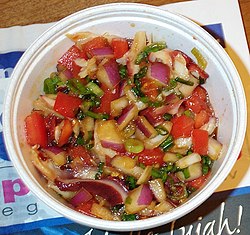Khan
Gone but not forgotten
- Joined
- Aug 23, 2006
- Messages
- 6,924
I'm lunching Friday at a seafood buffet, so I'll have an extra scoop on your behalf!
Funny, I never seem to get around to buying poke to eat at home. I'll have to see if it's in the commissary or Costco.
Spouse and I are among the world's laziest cooks. I know I'm surrounded by fresh fish but I just buy the frozen filets, thaw two of them, and heat them in the convection microwave for 14 min at 400 degrees. I'll have one for lunch that day and freeze the other to reheat another day. I rotate among mahimahi, ahi, salmon, and (when it's available) swordfish.
Of course if someone's cleaning out their fridge, or if they need help with their boat, or if they're trying to recoup the cost of gas from their last weekend fishing trip... I'm there for them.
I've tried sardines in tomato sauce but I've just never acquired the taste. Maybe again someday.
Sardines in olive oil added to a leafy salad with a bit of vinegar.
Smoked kippers on whole grain bread...

